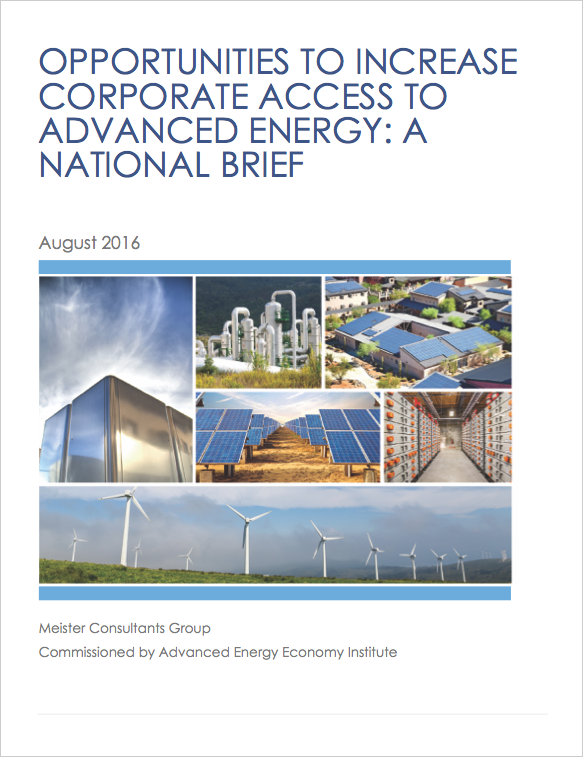by Brianna Crandall — August 26, 2016 — Meister Consultants Group, an international sustainability consulting firm, recently released a report outlining policy changes that states can enact to expand corporate access to advanced energy. The report identifies 11 states with a strong corporate presence in which one or more of the policies profiled has the potential to create new opportunities for corporate competitiveness.
The report focuses on six policies that would enable companies to purchase advanced energy, and for each one considers where these policies have the greatest potential to expand corporate access to advanced energy, assessing the regulatory and policy environment, potential market size for corporate purchases, and renewable energy potential of all 50 states.

The market brief identifies policies that will allow companies to choose renewable energy to power operations, with 11 states showing the greatest market potential.
The report, Opportunities to Increase Corporate Access to Advanced Energy: A National Brief, prepared for Advanced Energy Economy (AEE) Institute, explains that for many companies, the ability to control energy costs and sources is a key factor when deciding where to locate or expand their operations. Increasingly, companies are specifically seeking opportunities to purchase advanced energy — a choice often backed by an internal sustainability goal or renewable energy target.
Graham Richard, CEO of Advanced Energy Economy (AEE), a national business organization with which the AEE Institute is affiliated, stated:
Providing opportunities for companies to access advanced energy is a win-win for states. Adopting policies like those outlined in this report signal to companies that the state is open for business. That will unleash private investment in new energy infrastructure and drive economic growth in the state.
To put the market potential for corporate advanced energy purchases into perspective, if half of electricity demand from commercial and industrial customers nationally were met by renewable energy, this would drive development of nearly 450 gigawatts (GW) of renewable energy — more than double current capacity nationwide, and enough to power over 100 million houses, points out the report.
However, in many states, companies are restricted in their options to make these purchases. The report outlines six policies for advanced energy, identifying the states with the largest corporate demand and strongest renewable resources in which the policies could expand options for corporate consumers.
According to the report, three of these policies enable companies to purchase electricity from large-scale offsite advanced energy projects: Utility Renewable Energy Tariffs, through which companies can purchase renewable energy competitively sourced by their utility, “Back-to-back” Utility PPAs, in which the utility acts as an intermediary between a customer and renewable energy developer, and Direct Access Tariffs, which allow certain customers in traditionally regulated markets to choose their electricity source. These policies open up purchasing options generally not available to companies located in vertically integrated states.
The three remaining policies allow companies to access energy from distributed energy resources: raising system size limits for programs that credit distributed generation, such as net metering; allowing third-party ownership of onsite generation systems; and allowing virtual or aggregated metering to enable companies to benefit from distributed energy even when their needs are not met by a single onsite system at a single building.
While most states around the country currently have policies in place that support onsite or distributed advanced energy, not all of them are structured to enable the participation of larger corporate users, and these three policies can enable companies in particular to benefit from distributed resources.
After considering states’ regulatory and political environments, 11 states stood out. The report summarizes the top 5 for one or more of the policies profiled on the basis of its potential to increase corporate access to renewable energy. Of these, 11 made the top 5 list for one or more of the policies: Alabama, California, Florida, Georgia, Indiana, Kentucky, Michigan, Minnesota, North Carolina, Ohio and Texas. Applicable policy options for each state can be found in the Executive Summary of the report.
The report, Opportunities to Increase Corporate Access to Advanced Energy: A National Brief, is available to download from the AEE Web site upon brief registration.





